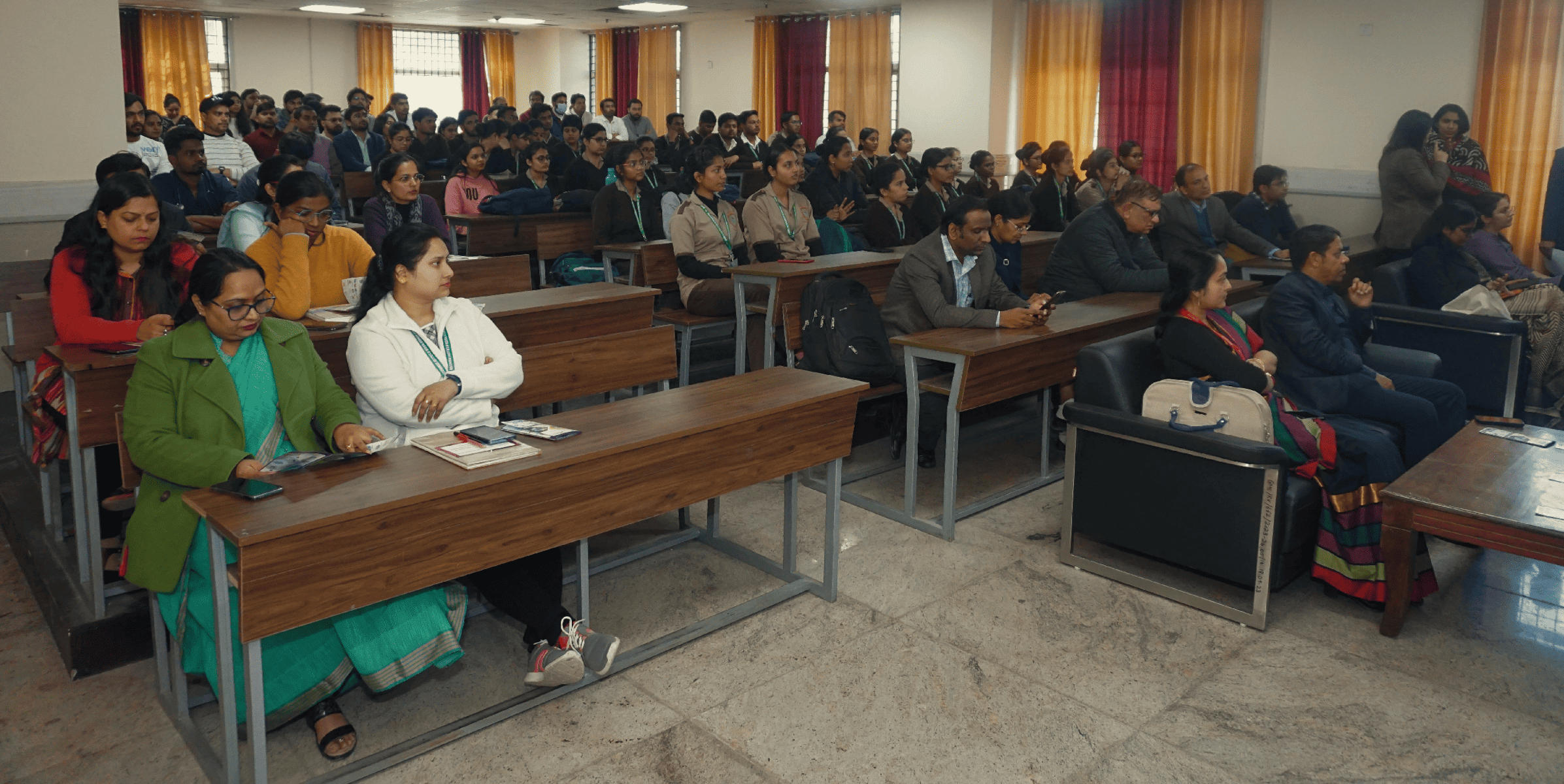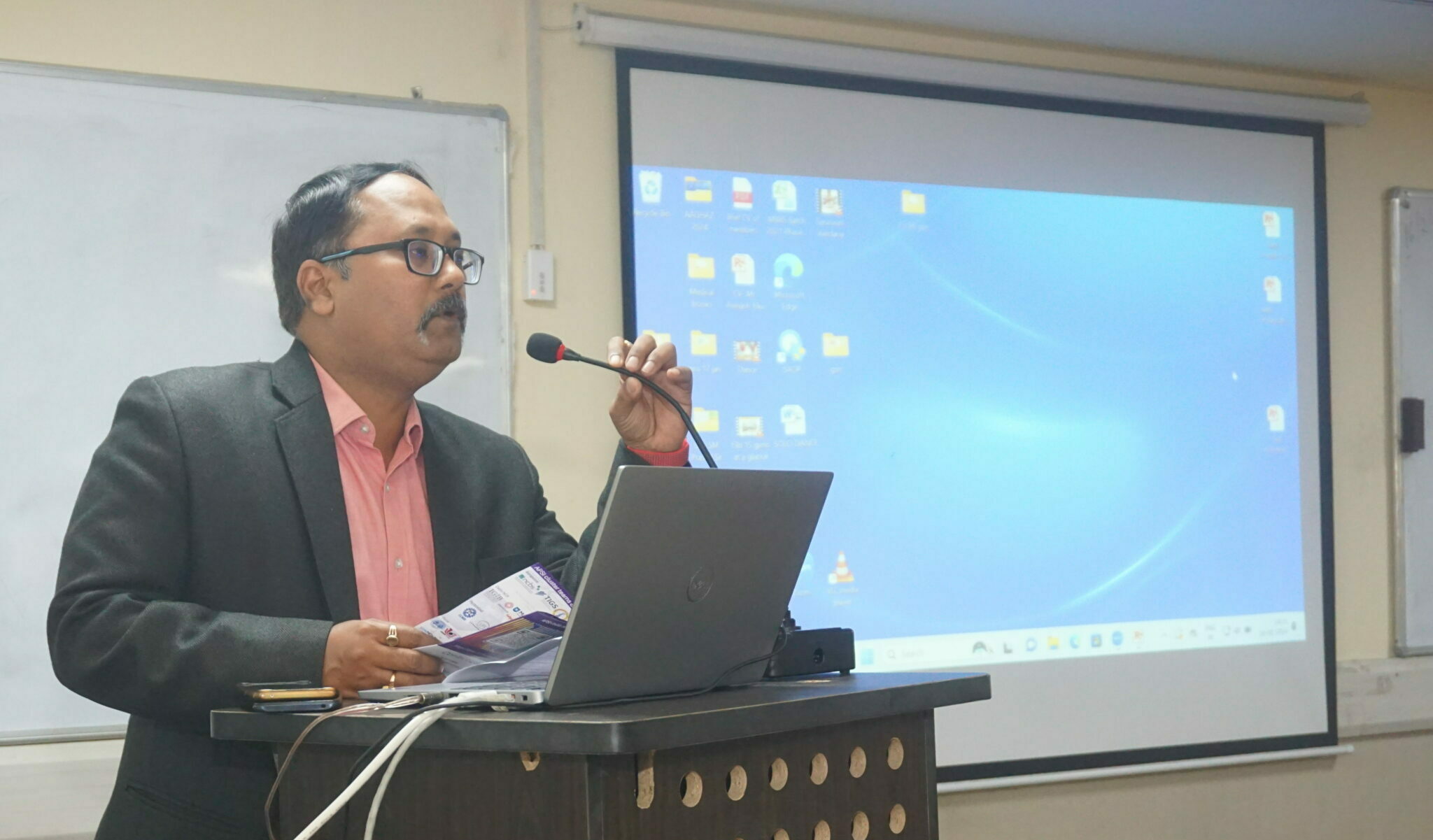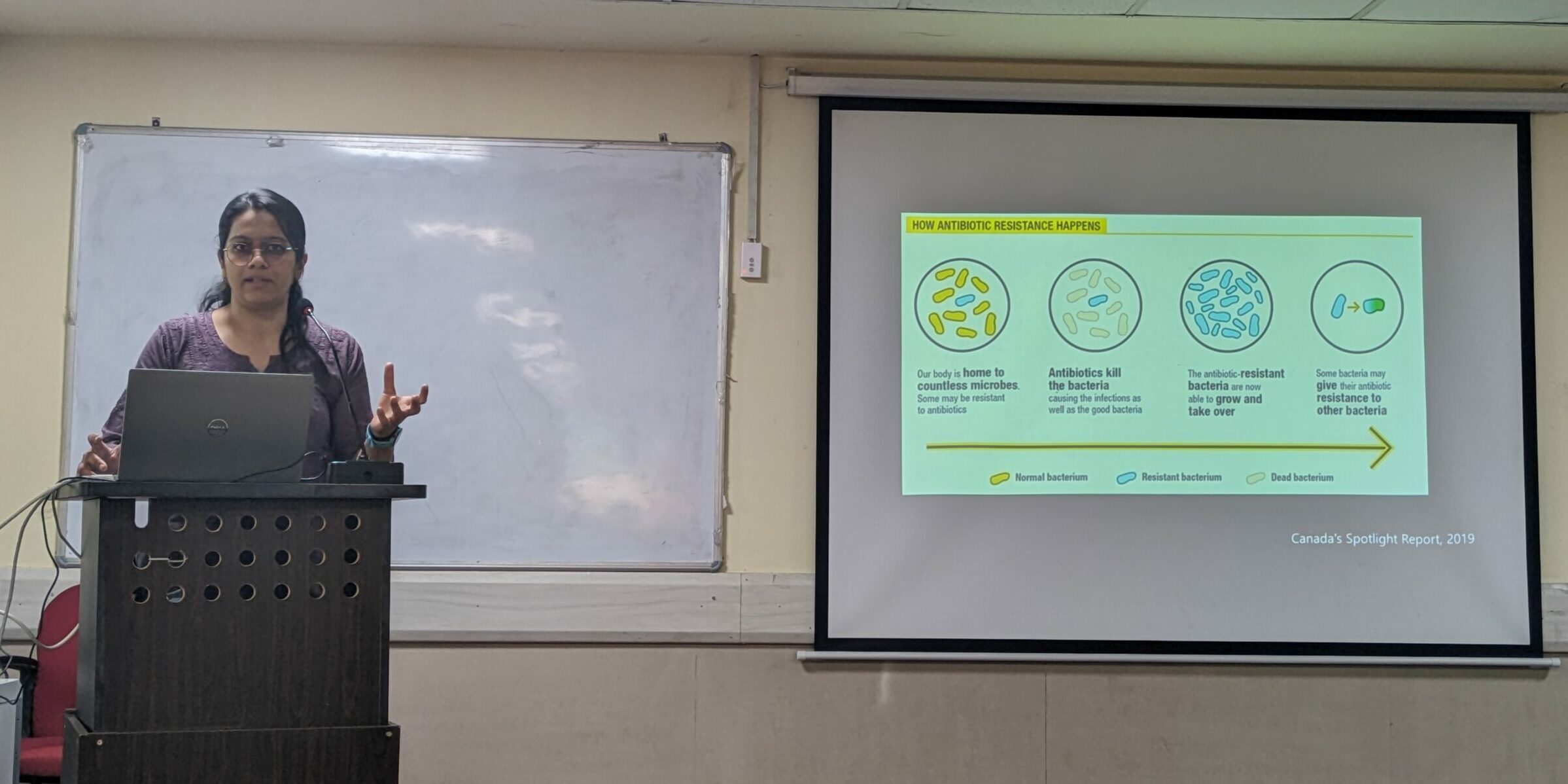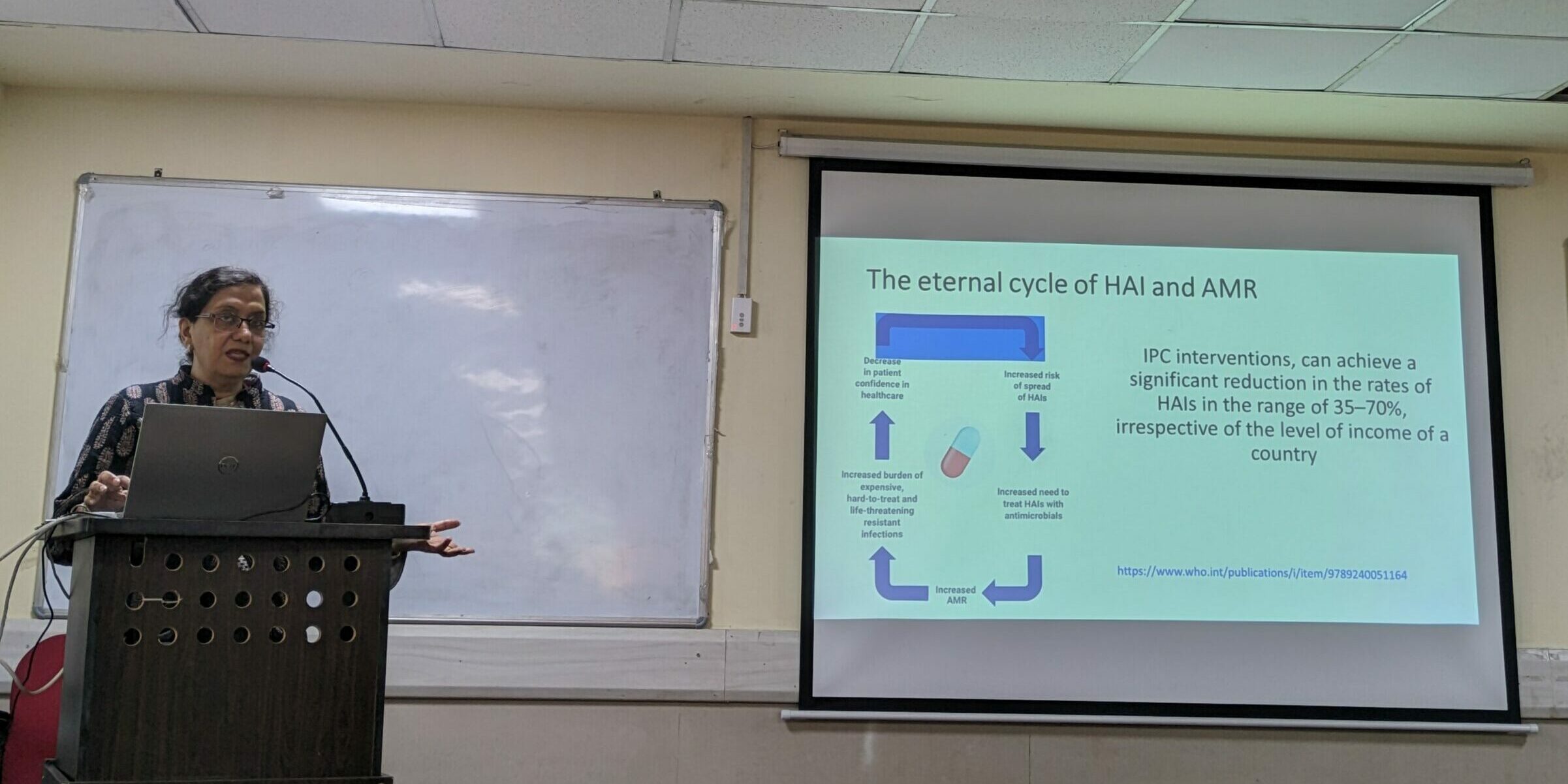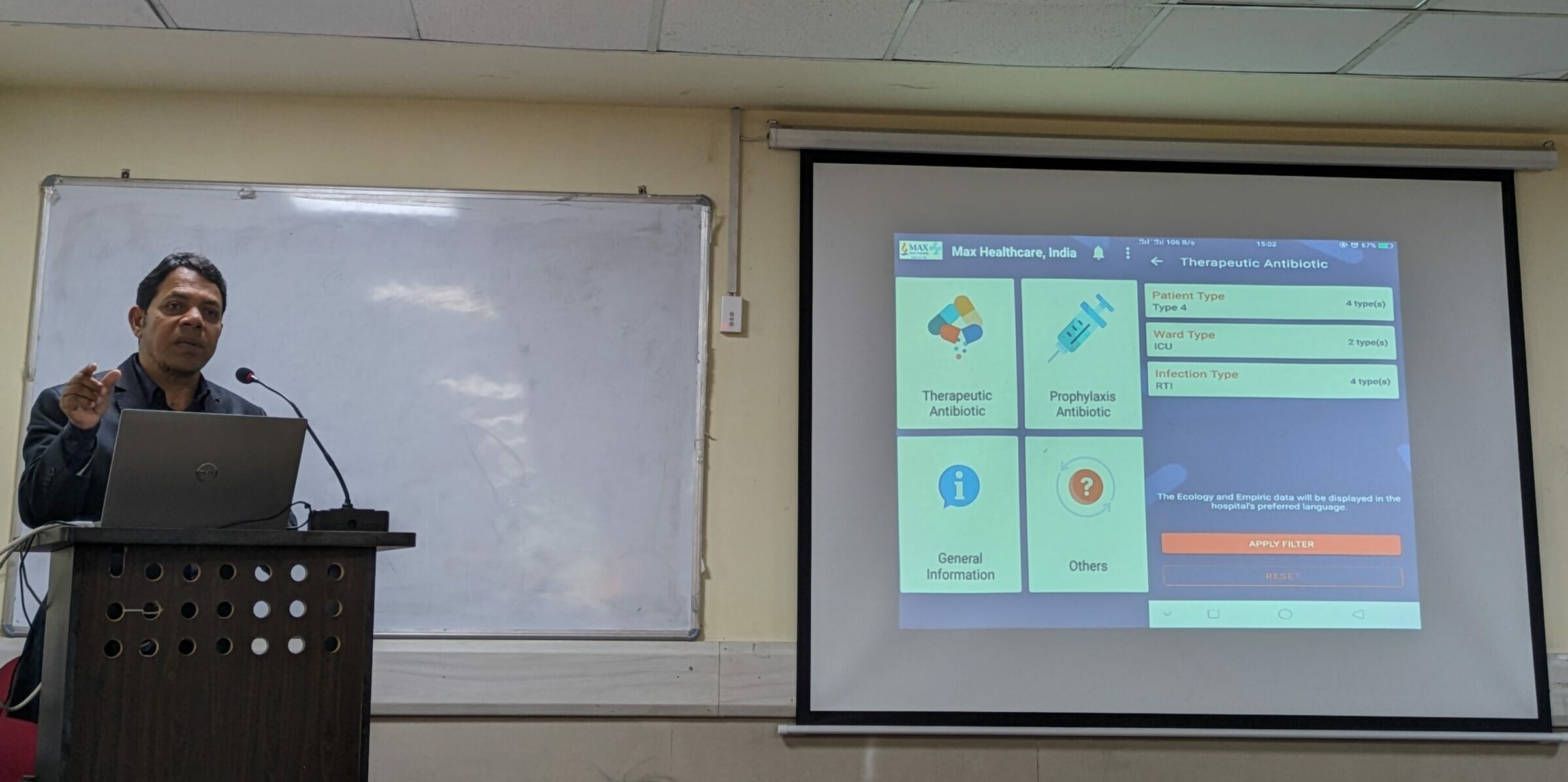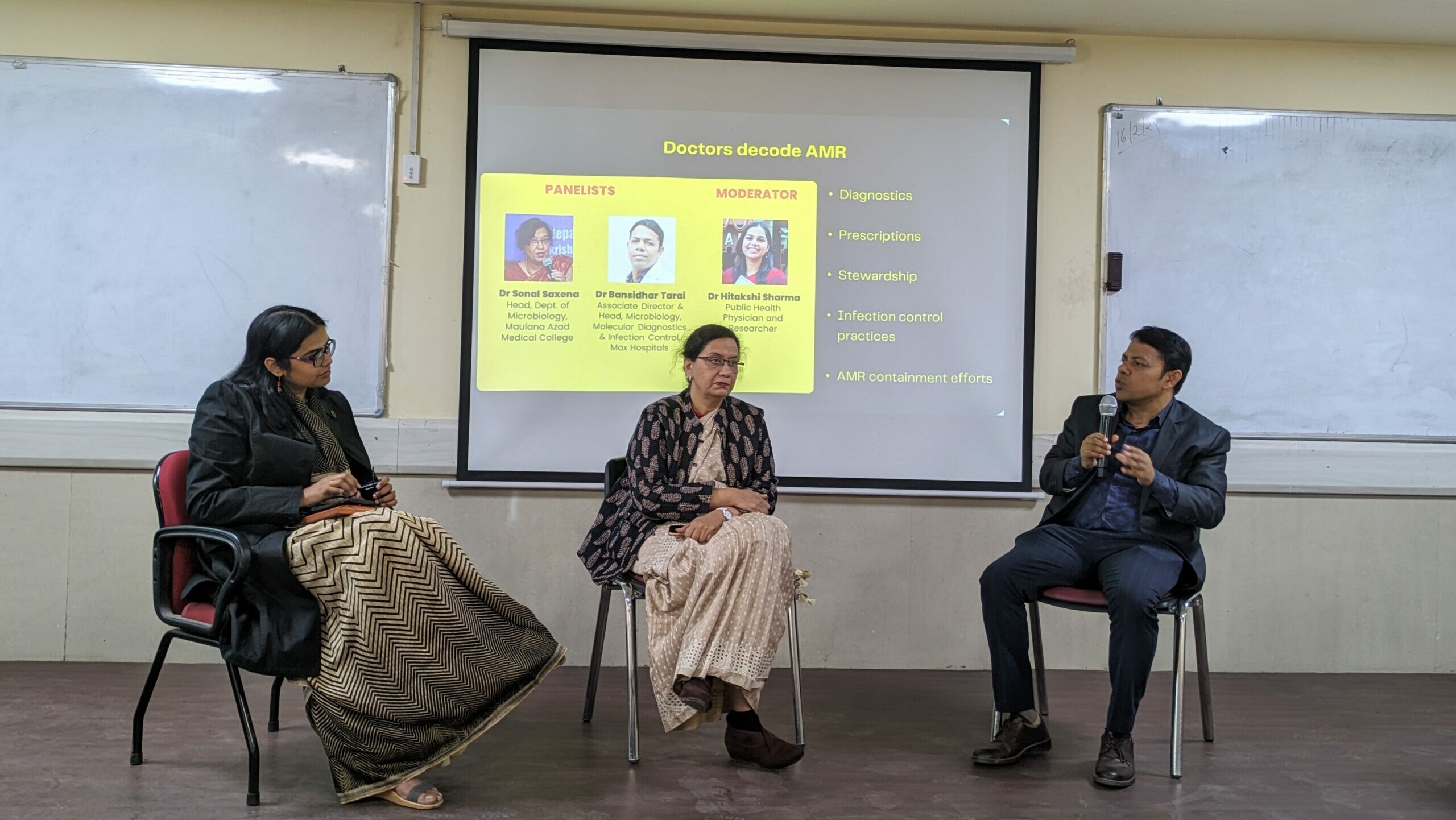The fifth workshop in the AMR Frontline series, a Superheroes against Superbugs initiative, was conducted in collaboration with Ashoka University at the Government Institute of Medical Sciences (GIMS) Greater Noida, Delhi. Funded by the Rockefeller Foundation as a part of the Alliance for Pathogen Surveillance Innovations (APSI) in India, the event took place on February 16, 2024. It was designed to address the critical issue of Antimicrobial Resistance (AMR) for healthcare professionals.
Unlike the previous workshops in this series, which were tailored to 2nd-year medical students, this two-hour workshop at GIMS Greater Noida engaged over 120 practicing healthcare professionals, including nursing students, medical interns, junior resident doctors, and senior doctors.
Dr. Anurag Srivastava delivering the welcome address at the beginning of the workshop.
The event began with a welcome address from Dr. Anurag Srivastava, Head and Professor of Community Medicine at GIMS. Dr. Srivastava’s remarks set the tone for the workshop, stressing the pivotal role of healthcare professionals in addressing the AMR challenge and advocating for active participation in AMR-related public health initiatives.
Participants were then provided with a dynamic educational experience, including in-depth expert lectures and an interactive panel discussion. The workshop featured eminent specialists: Dr Shraddha Karve, Research Faculty Fellow at Ashoka University; Dr Sonal Saxena, Director Professor and Head at the Department of Microbiology at the Maulana Azad Medical College; Dr. Bansidhar Tarai, Associate Director and Head of Microbiology, Molecular Diagnostics & Infection Control Departments, Max Hospitals, and Dr. Hitakshi Sharma, Public Health Physician and Researcher. They provided comprehensive insights into the various aspects of AMR, Surveillance, and Stewardship.
Expert Talks
The first talk of the workshop focussed on AMR surveillance. Dr. Shraddha Karve emphasized the importance of combining clinical and environmental data for effective AMR control, highlighting APSI’s role in developing comprehensive surveillance systems across India. Dr. Karve’s presentation showed wastewater surveillance techniques for detecting AMR, from sample collection to marker identification. The aim is to create affordable, on-site AMR testing kits from wastewater, aiding in the identification of prevalent pathogens and enhancing targeted public health interventions.
Dr. Shraddha Karve introducing the participants to antibiotic resistance development in microbes.
In the following session, Dr. Sonal Saxena enlightened the participants on the crucial role of cleanliness and hygiene in warding off infectious disease outbreaks. She highlighted the importance of the WASH (Water, Sanitation, and Hygiene) protocol in mitigating antimicrobial resistance in community settings. Transitioning to hospital settings, she emphasized the critical need for stringent infection control measures to break the cycle of infection in healthcare environments. Her presentation was enriched with case studies on antibiotic stewardship and infection transmission, engaging healthcare professionals and allowing them to contextualize and deepen their understanding of AMR and stewardship practices.
Dr. Sonal Saxena talking about the infection cycle and its role in AMR in clinical settings.
Dr. Bansidhar Tarai delivered a captivating talk on the AMR stewardship program at Max Hospitals. He detailed the digital management of the AMR stewardship program and discussed the program components, including antibiograms, antibiotic policies, and real-time alert systems for monitoring antibiotic use. Dr. Tarai emphasized the role of all healthcare professionals in the effective monitoring and implementation of AMR stewardship program recommendations. He concluded with insights on a new rapid syndromic testing technology, enhancing the hospital’s capability in diagnosing pathogens with resistance genes, thus strengthening AMR mitigation strategies in clinical settings.
Dr. Bansidhar Tarai talking about the digital management of the AMR Stewardship Program at Max Hospitals.
Doctors decode AMR: A panel discussion on AMR in healthcare settings
The workshop featured an extensive educational experience through a panel discussion tailored to deepen the participants’ understanding of AMR. Dr. Hitakshi Sharma moderated the discussion, with Dr. Sonal Saxena and Dr. Bansidhar Tarai as panelists. The discussion revolved around essential healthcare strategies like patient prognosis, correct diagnosis, prescription practices, and collaboration between different healthcare departments for the responsible usage of antibiotics in clinical settings. Dr. Sonal Saxena and Dr. Bansidhar Tarai also stressed that AMR awareness should start at the school level and continue through all stages of medical education and practice.
Key Discussion Points:
-
Diagnosis and Sample Collection: The panel emphasized the need for accurate diagnosis and proper sample collection techniques. Information and education on these aspects of primary healthcare are crucial for ensuring the reliability of diagnostic outcomes.
-
Prescription Practices: The discussion highlighted that antibiotics should not be seen as the problem; they are healthcare treatments that must be used judiciously. However, a balance between patient care and antimicrobial stewardship (AMS) is essential to prevent resistance development. In addition, it is crucial to understand that antibiotics should not be used as prophylaxis (prevention), except in surgical cases, with vaccination as the primary preventive measure.
-
Empirical to Targeted Therapy: The transition from empirical therapy to targeted therapy upon the availability of diagnostic evidence was emphasized during the deliberation. Utilizing the right tools for diagnosis and considering the duration of therapy are important factors in this process.
-
Interdepartmental Communication: The panel stressed the importance of communication and collaborative decision-making in the healthcare sector. Microbiologists and clinicians need to come together to discuss cases and reports. Low-cost solutions like SMS systems for blood culture reports and WhatsApp groups can facilitate timely information sharing.
-
De-escalation Strategies: The panel advocated for de-escalation, such as switching from intravenous to oral antibiotics and broad to narrow-spectrum antibiotics once appropriate reports are available. They also emphasized the need to justify the continued use of antibiotics.
-
Continuous Medical Education: The panelists emphasized the significance of continuous education on AMR, starting from the MBBS stage throughout one’s career. This will enable practicing clinicians to stay updated with the latest developments in the field and keep up-to-date with evidence generation. The panel also referred to the latest government guidelines under formulation that will mandate all faculty and medical students to undergo AMS training under NCDC.
The challenge of antimicrobial resistance (AMR) requires a collective approach, not just limited to clinical microbiologists and infectious disease specialists. Clinicians across all specialties, along with pharmacists, pharmacologists, nursing staff, and administrative leaders, must collaborate to address this global health threat effectively. Strong communication and collaboration are pivotal in the fight against AMR. Therefore, educating and raising awareness about the dangers of AMR among healthcare professionals is imperative to foster an environment where continuous learning and active engagement in AMR-related issues are prioritized.
Dr. Hitakshi Sharma, Dr. Sonal Saxena and Dr. Bansidhar Tarai in the panel discussion “Doctors Decode AMR.”
In summary, the workshop was a comprehensive educational initiative that enhanced participants’ understanding of AMR and equipped them with practical knowledge and strategies to tackle it effectively in healthcare settings.
